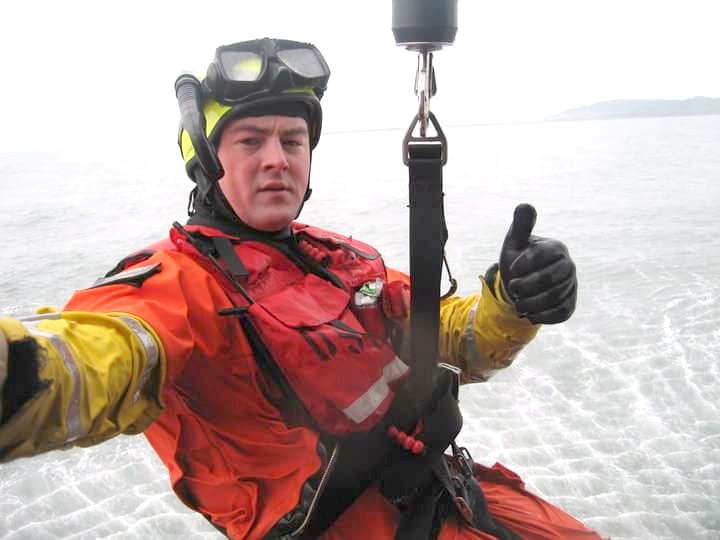PORT ANGELES –– A Coast Guard rescue swimmer and advanced helicopter rescue instructor hopes to swim across the Strait of Juan de Fuca this week, but needs a support vessel before he attempts the swim.
Blake Arnold, an Aviation Survival Technician First Class stationed in U.S. Coast Guard Aviation Training Center in Mobile, Ala., plans to swim from Sooke, B.C. to Crescent Bay this week — if he can secure the support boat.
His swim would not be sanctioned by the Northwest Open Water Swimming Association, a nonprofit that observes, documents and records marathon swims in the Pacific Northwest, because he is planning to attempt the swim wearing a wet suit, something that is prohibited in sanctioned marathon swims.
When Arnold purchased his airline ticket to Port Angeles he had an escort boat secured, but repairs for that boat fell behind schedule and the plan fell through, he said.
“My support vessel is my lifeline,” he said.
He will not make the swim if he cannot secure another boat.
Arnold is asking experienced boaters who would like to help out to give him a call at 334-333-8688.
He doesn’t have a minimum requirement for the boat, just that it will go slow and take a beating from the wind and waves.
“I have to know they are very experienced,” he said. “I wouldn’t allow just anyone to help me without speaking to them at length. I’m not going to put myself or anyone else at risk.”
He hasn’t yet planned any specific day for the swim — which would be about 10.4 miles — but hopes to do it sometime this week.
His plan is that he and his crew, including a kayaker, would leave Port Angeles in the morning, travel to Victoria to check in with customs, and then he would swim back from Sooke.
The rescue swimmer has been planning the trip for the past six months and has wanted to swim across the Strait of Juan de Fuca for the past year and a half, he said.
Marathon swimming rules require swimmers to be completely unassisted, which means — among other conditions — no wet suits.
Because he lives in Alabama, which has water much warmer than in the Strait, Arnold said he plans to use a wet suit during the swim.
“I wouldn’t compare it to someone who swims unassisted,” he said.
“It’s obviously much more difficult.”
Seven people have swam across the Strait unassisted.
Swimmers can acclimate their bodies to withstand colder waters with repeated exposure over a year, he said.
He typically swims in 80-degree water and feels it’s much safer for him to use a wet suit on this swim.
Even with the wet suit, provided for free by his sponsor BlueSeventy, it still won’t be an easy task, he said.
To prepare for such a long swim, he’s had to spend a “good amount of time” swimming in open water.
“With my job, I can accomplish that rather easily,” he said.
For Arnold, the swim is less of a test of his physical endurance and more of a test of his mental toughness, he said.
“If you can swim, there’s nothing to stop you from swimming longer distances,” he said.
“That’s something I’ve been tested on numerous times in my career in the Coast Guard.”
Arnold has been in the Coast Guard for 14 years and a rescue swimmer for the past 11 years.
Arnold said he swam 12.5 miles around Key West.
________
Reporter Jesse Major can be reached at 360-385-2335, ext. 5550, or at jmajor@peninsuladailynews.com.

